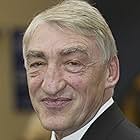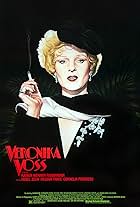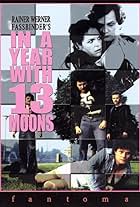Maria marries Hermann Braun in the last days of World War II, only for him to go missing in the war. Alone, Maria puts to use her beauty and ambition in order to find prosperity during Germa... Read allMaria marries Hermann Braun in the last days of World War II, only for him to go missing in the war. Alone, Maria puts to use her beauty and ambition in order to find prosperity during Germany's "economic miracle" of the 1950s.Maria marries Hermann Braun in the last days of World War II, only for him to go missing in the war. Alone, Maria puts to use her beauty and ambition in order to find prosperity during Germany's "economic miracle" of the 1950s.
- Awards
- 13 wins & 7 nominations
- Bill
- (as George Byrd)
- Hans Wetzel
- (as Günther Lamprecht)
Storyline
Did you know
- TriviaThe abbreviation "LSR," seen painted on various walls throughout the film, stands for "Luftschutzraum," German for "air raid shelter".
- GoofsAt the end of the cut of the two kids blowing up the firecrackers, they start laughing but no sound is heard. The sound of laughter is heard on the next cut after they get yelled at by the man scavenging for wood.
- Quotes
Maria Braun: I'm a master of deceit: a capitalist tool by day, and by night an agent of the proletarian masses - the Mata Hari of the Economic Miracle.
- Crazy creditsAt the very end of the credits the following persons are 'credited' by their picture: Konrad Adenauer, Ludwig Erhard, Kurt Georg Kiesinger and Helmut Schmidt and a disconnected phone line can be heard.
- SoundtracksIn The Mood
Written by Wingy Manone, Andy Razaf and Joe Garland
Trouble arises, as happens in Rainer Werner Fassbinder's melodramas, and as its one of his best and most provocative, we see as Maria (uncommonly gorgeous Hanna Schygulla in this role) will do a two-face: she'll stand by her man, even if it means working at a bar for American GI's and, even still after she hears from a fellow soldier that Hermann has died will still stand by him as she sleeps with a black GI and comes close to bearing his child (that is, naturally, until he reappears and a murder occurs and he takes the rap so she can be safe), or working for a German businessman (effectively sympathetic Ivan Desny) and becoming his sometimes mistress and rising star in the company. Maria will do whatever it takes to be successful, but she'll always be married.
It's hard to say there's anything about Maria that isn't fascinating. Money, sex, power, all of these become interchangeable for Maria. She's like the feminist that has her cake and eats it with a sultry smile: she gets to have a husband, more or less (actually a lot less until the last ten minutes of the film) while obtaining things- a man who dotes on her whenever he can, a new and expensive house with servants, a secretary, money- that others around her aren't getting due to already being with a man or too weak in a position to rise anywhere (such as the secretary, played interestingly enough by Fassbinder's own mother).
Maria is sexy, confident, and all alone, with an idealized life going against a life that should be made in the shade. She says of the two men- the American soldier and poor old and sick Oswald- that she's fond of them, and at the same time will stick by those roses the confused and soul-searching husband Hermann sends from Canada, after being released from prison. She's casts a profile that a feminist would love to trounce, but understand where she's coming from and going all the way.
Fassbinder employs this inherent contradiction, and moments with Maria appear to go against the conventions of a melodrama (for example, Hermann walking in on the jubilant and half-naked Maria and GI is just about a masterpiece of a scene, with Maria's reaction not of surprise or guilt but pure happiness to see that he's there let alone alive), while sticking to his guns as a director of such high-minded technique with a storyline that should be predictable. But it isn't really. It's like one big metaphor for a country that, after the war, couldn't really move on to normalcy. A few times Fassbinder puts sound of the radio on in the background, and we see Maria walking around her family house, hustle and bustle going on around her, and the radio speaks of a divided Germany, of things still very unsettled, of a disarray. Maybe the only way to cope is excess, or maybe that's just my interpretation of it.
It's hard to tell, really, under Schygulla's stare face and eyes, anyway. It's such an incredible performance, really, one of those showstoppers that captures the glamor and allure of an old-time Hollywood female star while with the down-and-dirty ethic of a girl of the streets. Most telling are the opposing costumes one sees in one scene when she finally is with her husband, where she stars in one of those super-lustful black lingerie pieces and high heels, and then moves on to a dress without even thinking about it. That's almost the essence of what Maria is, and Schygulla wonderfully gets it down, a headstrong but somehow loving figure who is adored and perplexed by the men around her, sometimes in a single sentence. This is what Fassbinder captures in his wonderful first part of his "trilogy"; while I might overall prefer Veronika Voss as a masterpiece, Maria Braun is perhaps just as good as a character study, of what makes a woman tick and tock with (almost) nothing to lose.
- Quinoa1984
- Jun 20, 2009
- Permalink
- How long is The Marriage of Maria Braun?Powered by Alexa
Details
- Release date
- Country of origin
- Official sites
- Languages
- Also known as
- Die Ehe der Maria Braun
- Filming locations
- Production companies
- See more company credits at IMDbPro
Box office
- Budget
- DEM 1,975,000 (estimated)
- Gross US & Canada
- $8,144
- Opening weekend US & Canada
- $11,623
- Feb 16, 2003
- Gross worldwide
- $11,859
Contribute to this page

































